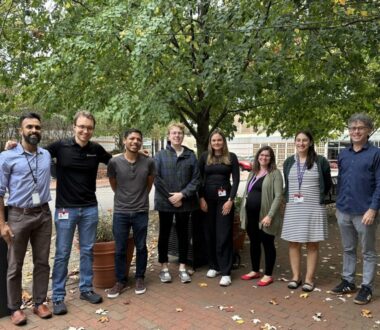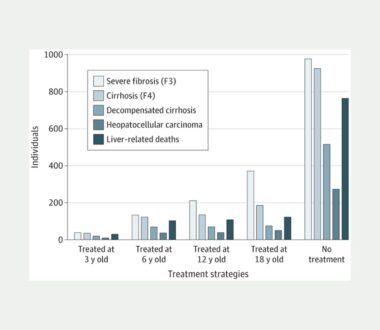
Health Economic Outcomes of a Minimal Monitoring Approach to Providing HCV Therapy
In a new article in Hepatology Communications, lead author and CHERISH Population Data & Modeling Core Director Benjamin Linas and colleagues report new economic analyses from MINMON, an AIDS Clinical Trial Group (ACTG 5360) study that used a minimal monitoring approach to provide treatment for chronic hepatitis C virus (HCV). Findings suggest that the simplified […]

Simulation Consultation: San Francisco Department of Public Health
The Syndemics Lab, led by CHERISH Population Data & Modeling Core Director Benjamin Linas, uses simulation models to investigate population-level outcomes, costs, and cost-effectiveness of interventions and care delivery models to treat HIV, hepatitis C virus (HCV), and substance use disorder. In addition to their core research, the Boston-based team collaborates with real-world decision-makers to […]

Hepatitis C Virus Screening in Pregnant and Nonpregnant Women After Universal Screening Guidelines
Hepatitis C virus (HCV) testing guidelines were updated in 2020 to provide universal, one-time screening for adults ages 18 through 79 and during each pregnancy. This departure from their 2013 recommendation not only aims to improve early detection of HCV across age groups but also acknowledges pregnancy as a critical period for diagnosing and treating […]

Offering Buprenorphine in Homeless Shelters in Massachusetts Projects Life- and Cost-saving Results
Overdose is the leading cause of death among people with opioid use disorder (OUD) who are experiencing homelessness. Innovative care models that meet this population outside of office-based settings can improve access to buprenorphine, a medication for treating OUD, and avert fatal overdoses. In this study, Avik Chatterjee, lead author and addiction specialist at Boston […]

Cost-Effectiveness of Fibrosis Staging
More than 4 million people in the U.S. live with a hepatitis C virus (HCV) diagnosis. However, as of 2022, fewer than one-third of individuals infected with HCV have been cured due to barriers related to high direct-acting antiviral (DAA) pricing and the steps involved in determining someone’s degree of liver disease or fibrosis. In […]

Intern Spotlight: Noah Jenkins and Simrun Rao
At the start of summer, we welcomed undergraduate students Noah Jenkins and Simrun Rao. As rising seniors, Jenkins and Rao have been selected as part of the Summer Undergraduate Mentored Research (SUMR) Program at University of Pennsylvania and the NIDA Summer Research Internship Program. Working alongside CHERISH investigators Zachary Meisel at the Leonard Davis Institute […]

Cost-Effectiveness of Strategies for Treatment Timing for Perinatally Acquired Hepatitis C Virus
Children with perinatally acquired hepatitis C virus (HCV) are now eligible to receive direct-acting antivirals (DAAs), a highly effective treatment for HCV, as early as the age of 3. Despite existing studies demonstrating DAA’s high efficacy and tolerance among adults and children between the 3 and 12 years old, there has been low uptake due […]

Intern Spotlight: Valeria Arango, Benicio Beatty, Ameya Komaragiri, Carlos Ponce de Leon Mendez, and Ella Salim
During the peak hour of a July summer day, CHERISH colleagues and interns from Boston Medical Center logged onto Zoom while investigators and staff in New York City filled a conference room located on the Upper East Side at Weill Cornell Medicine. Three minutes past twelve, Caroline Savitsky, program manager in the Section of Infectious […]

Ending HIV in the United States Will Require a Substantial Financial Commitment
“What will it take to end HIV in the United States?” is a pressing question posed by public health officials, researchers, and policymakers alike. Population Data & Modeling Core Director Benjamin Linas seeks to answer that question by amplifying notable results from a simulation modeling study published by researchers at Johns Hopkins. In an editorial issued in the Annals of […]

Characterizing Initiation, Use, and Discontinuation of Extended-Release Buprenorphine in a Nationally Representative United States Commercially Insured Cohort
Medications for opioid use disorder (MOUD) are evidence-based treatments that help people reduce or stop using opioids. However, high discontinuation rates of MOUD pose a barrier to reducing opioid-related overdoses. Extended-release buprenorphine (XR-BUP) is a relatively new MOUD, approved in late 2017, that has the potential to increase retention because of its monthly dosing schedule. Currently, there is […]

CHERISH Awarded Five-year Center of Excellence Grant to Continue Substance Use Health Economics Research
The National Institute on Drug Abuse (NIDA) of the National Institutes of Health has awarded the Center for Health Economics of Treatment Interventions for Substance Use, HCV and HIV (CHERISH) a five-year grant to continue the Center’s activities as a national center of excellence. CHERISH was founded in 2015 as a multi-institutional center for health […]

Simulation Modeling Presents Opportunities To Support The Public Health Response To The Opioid Crisis In North America
Although there are several evidence-based cost-effective interventions for people with opioid use disorder (OUD), they are underutilized. Questions remain regarding intervention selection, and cost of service delivery. Simulation modeling offers an opportunity to support decision making to address the syndemic of opioid overdose, HIV, and hepatitis C (HCV). In an article recently published in the International Journal […]
Engage with CHERISH
Submit a Consultation Request or Contact Us to learn more about how CHERISH can support your research or policy goals.